

Tipping towards the unknown. Millennium Ecosystem Assessment. Planetary Boundaries : Specials. Leverage Points: Places to Intervene in a System. By Donella Meadows~ Folks who do systems analysis have a great belief in “leverage points.”
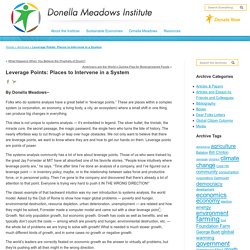
These are places within a complex system (a corporation, an economy, a living body, a city, an ecosystem) where a small shift in one thing can produce big changes in everything. This idea is not unique to systems analysis — it’s embedded in legend. The silver bullet, the trimtab, the miracle cure, the secret passage, the magic password, the single hero who turns the tide of history. The nearly effortless way to cut through or leap over huge obstacles. The systems analysis community has a lot of lore about leverage points. The classic example of that backward intuition was my own introduction to systems analysis, the world model. The world’s leaders are correctly fixated on economic growth as the answer to virtually all problems, but they’re pushing with all their might in the wrong direction. Counterintuitive. (in increasing order of effectiveness) 9.
I realized that I had a lot of explaining to do. Using Emergence to Scale Social Innovation, by Margaret Wheatley and Deborah Frieze. In spite of current ads and slogans, the world doesn't change one person at a time.
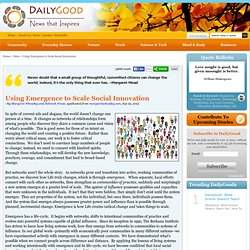
It changes as networks of relationships form among people who discover they share a common cause and vision of what's possible. This is good news for those of us intent on changing the world and creating a positive future. Rather than worry about critical mass, our work is to foster critical connections. We don't need to convince large numbers of people to change; instead, we need to connect with kindred spirits. Through these relationships, we will develop the new knowledge, practices, courage, and commitment that lead to broad-based change. But networks aren't the whole story. Emergence has a life-cycle. Why we need to understand networks Researchers and social activists are beginning to discover the power of networks and networking.
Networks are the only form of organization used by living systems on this planet. Yet much of the current work on networks displays old paradigm bias. What is Emergence? Thinking Outside the Boxes in Our Heads. The modern technologically “advanced” world that surrounds us today is an outgrowth of our society’s ways of thinking- what has been called Aristotelian logic, dualistic thinking or compartmentalization.
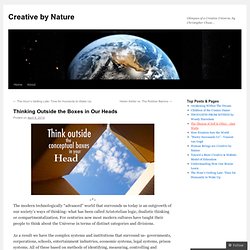
For centuries now most modern cultures have taught their people to think about the Universe in terms of distinct categories and divisions. As a result we have the complex systems and institutions that surround us- governments, corporations, schools, entertainment industries, economic systems, legal systems, prison systems. All of these based on methods of identifying, measuring, controlling and manipulating “things” – discrete objects and units. As such, many of the problems humans have created- from poverty, war and racism to global warming & environmental destruction- have their roots in these dualistic ways of thinking. Spiral Dynamics - Decision Making Training from MindTools.com. Understanding How Values May Affect Decisions A spiral continues to turn and change. © iStockphoto/danleap When you look back on your actions, decisions, and ways of coping with problems, were your responses consistent?
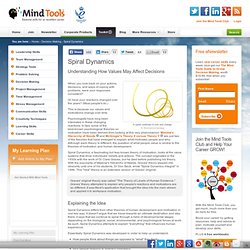
Or have your reactions changed over the years? (Most people's do.) This is because our values and motivations change over time. Psychologists have long been interested in these changing reactions. Gaia hypothesis. The study of planetary habitability is partly based upon extrapolation from knowledge of the Earth's conditions, as the Earth is the only planet currently known to harbour life The Gaia hypothesis, also known as Gaia theory or Gaia principle, proposes that organisms interact with their inorganic surroundings on Earth to form a self-regulating, complex system that contributes to maintaining the conditions for life on the planet.
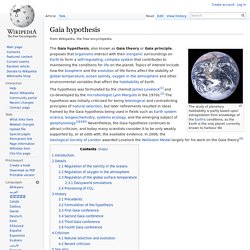
Topics of interest include how the biosphere and the evolution of life forms affect the stability of global temperature, ocean salinity, oxygen in the atmosphere and other environmental variables that affect the habitability of Earth. Introduction[edit] Less accepted versions of the hypothesis claim that changes in the biosphere are brought about through the coordination of living organisms and maintain those conditions through homeostasis. In some versions of Gaia philosophy, all lifeforms are considered part of one single living planetary being called Gaia. Whole Systems. This area is devoted to the study of whole systems.
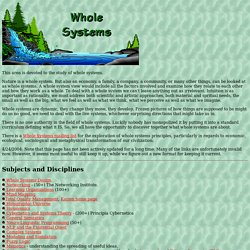
Nature is a whole system. But also an economy, a family, a company, a community, or many other things, can be looked at as whole systems. A whole system view would include all the factors involved and examine how they relate to each other and how they work as a whole. To deal with a whole system we can't leave anything out as irrelevant.
Holarchies. By Flemming Funch, 4 Feb 95.
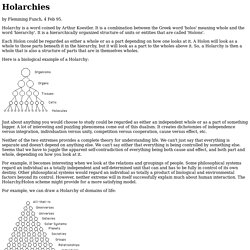
Holarchy is a word coined by Arthur Koestler. It is a combination between the Greek word 'holos' meaning whole and the word 'hierarchy'. It is a hierarchically organized structure of units or entities that are called 'Holons'. Each Holon could be regarded as either a whole or as a part depending on how one looks at it. ICLEI USA.